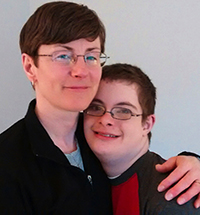Eighth-grader Bryan Galvez aptly summarized the consequences of healthy versus risky decisions when it comes to teens and sex. “Would you rather have a baby or reach your goals?” he asked.
Healthy relationships, pursuing dreams, abstinence, and having accurate information about the human body are topics schools are addressing thanks to a new health education program for special-education students. Bryan, who attends Grandville Middle School, and hundreds of other local students are receiving instruction not often found in the special education curriculum.
Facilitator Trude Zbikowski was teaching the dozen Grandville students to think about relationships, health and why it’s important to abstain. She spent an hour talking about how to stop, think, act and take problem-solving steps when faced with situations that might lead to sexual activity.
‘Reaching Every Child: What’s New in Special Education’ is an ongoing series on special education in Kent County.

“In a firm voice say, ‘I don’t want to do this. I don’t want to be pressured. I’m not ready for this,’” demonstrated eighth-grader Eli Geie.
Zbikowski and two other facilitators are leading the 13-session program for 451 students in 45 middle, high school and transition program classes (for ages 18-26) in 18 school districts in Kent, Ionia and Montcalm counties. The program is offered in partnership with the YWCA, which offers two classes led by its own facilitators on coercion and violence prevention.
It’s greatly needed, said Cheryl Blair, Kent ISD health education consultant. “Everybody kind of thinks of these kids as asexual, and like they are not going to be sexual because they’re challenged in some ways. That’s not true.”
Kent ISD is one of 20 entities nationwide to receive the Sexual Risk Avoidance Education grant from the U.S. Department of Health and Human Services for the program, which has a focus on risk avoidance and abstinence. The grant is for $426,977 each year for three years, though Kent ISD must reapply each year, proving the program is on target and meets criteria. The lessons are adapted for students with a range of needs: emotionally impaired, mildly and moderately cognitively impaired, and autistic.

Misconceptions and Lack of Education Increase Risk
Blair said many students in self-contained special-education classroom are not learning about puberty, how their bodies work or sexual intercourse and its potential consequences. “I have learned that these students really don’t understand their bodies. They don’t understand good touch and bad touches… It’s so easy to be coerced.”
Special-education students face increased risk over their general education counterparts. National research studies indicate that girls in special education have double the pregnancy rates of general education females, higher risks of sexually transmitted infections, and a far greater risk for sexual assault, abuse and exploitation, according to a 2011 report.
Statistics also show that 41 percent of individuals with disabilities get married; 4.1 million parents have a disability; and 40 to 80 percent have a child taken away. Individuals with disabilities are also three to four times more likely to be sexually abused. About 80 percent of women with intellectual and/or developmental disabilities have been sexually assaulted.
“Everybody kind of thinks of these kids as asexual, and like they are not going to be sexual because they’re challenged in some ways. That’s not true.” — Cheryl Blair, Kent ISD health education consultant
Kent ISD received the grant because of its higher-than-average special education population, Blair said. The national average of students who qualify for special education services is 8.5 percent. In Kent County it’s 13 percent; in Ionia, 16.6 percent; and in Montcalm, 15.8 percent of students are designated as needing special education.

A Parent’s Perspective
Patty George’s son Casey George, who has Down Syndrome, is in seventh grade at Crossroads Middle School in Northview Public Schools. His class has completed the program.
“I felt that it was a great benefit to the class in general,” Patty George said. “For Casey specifically, it gave him information that he did not have, simplified for him at his level, without being too much and causing confusion.”
She said she knew Casey needed to be educated concerning sex, and the program was a great tool for that. “This is definitely information that he needs, that as a parent, I didn’t have the resources to communicate.”
She said a separate program for special-education students helps them grasp what they need to at their level, and where they can ask questions.
George’s concerns are that her son understands what’s right and wrong, in terms of boundaries and any actions done to him. “My big concern is that he’s a vulnerableindividual.”

Confidence, Goals and Learning to say ‘No’
At Grandville Middle, students are learning how to use social skills to lead healthy lifestyles as well as the physical repercussions of sexual activity. They talked about trusting their feelings when something seems wrong and getting out of risky situations.
Students talked about standing up straight, looking people in the eye and being firm in responding to pressures surrounding sex. They also discussed activities they can do in healthy relationships that don’t involve sex: go out to dinner, bowling, holding hands and walking in a park.
“If you respect yourself, you won’t have sex to be cool,” said eighth-grader Jessie Lyons.
Special-education teacher Emily Mann said she hasn’t seen a sexual education curriculum for the students until now.
“For quite some time, it’s been something I’ve been looking for,” she said. “I’ve always just talked about safety, but to have a program with an educator here to teach it — that too has been great.”
CONNECT
SNN Article: New Sex Ed Program Created for Special Education Students










